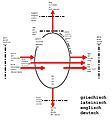Prefix facts for kids
A prefix is a special part of a word that you add to the very beginning of another word. It changes the meaning of the original word, or sometimes gives it a new meaning entirely! Think of it like a secret code at the start of a word. Prefixes are a type of affix, which means they are attached to words.
Contents
What Are Prefixes?
Prefixes are like building blocks for words. They come before the main part of a word (called the "root word") and give it a new twist. For example, if you add "un-" to "happy," you get "unhappy," which means "not happy."
Prefixes That Mean 'Not'
Many prefixes are used to mean "not" or "the opposite of." Here are some common ones:
- Un-: Like in unnatural, which means not natural.
- A-: Like in apolitical, meaning not political.
- Non-: Like in nonviolent, meaning not violent.
- In-: Like in indirect, meaning not direct.
Other Common Prefixes
Prefixes can have many different meanings. Here are a few more examples:
- Anti-: This prefix means against.
- Antisocial means against being social or not social.
- Antiglare means it works against glare (like on a screen).
- Auto-: This prefix means self or own.
- Autograph means a person's own signature.
- Autopilot means working by itself without human control.
- Bi-: Means two. For example, bicentennial means happening every two hundred years.
- Contra-: Means against or opposite. Like in contradiction, where two things are opposite.
- En-: Can mean to put into or cause to be. Encompass means to include or surround.
- Para-: Can mean beside or beyond. A paratrooper is a soldier who jumps with a parachute.
- Per-: Can mean through or thoroughly. Percent means per one hundred.
- Peri-: Means around or about. A periscope helps you see around obstacles.
- Proto-: Means first or original. A prototype is the first model of something.
- Poly-: Means many. Polytechnical means relating to many technical subjects.
- Re-: Means again or back. To react is to act back or in response.
- Semi-: Means half or partly. A semicolon is a punctuation mark that is half a colon.
Prefixes in Science and Medicine
Scientists and doctors often use prefixes to describe things precisely.
- Hepato-: This prefix means liver. So, hepatocellular means 'about liver cells'.
- Hydro-: This prefix means water. Hydroelectric dams make electricity using the flow of water.
- Pre- or Ante-: These prefixes mean before. Prenatal diagnostics are tests done before a baby is born.
- Post-: This prefix means after. A post-traumatic experience is something that happens after a trauma.
Making New Words
Sometimes people create new words by adding a prefix to an existing word. These words might not be in a dictionary at first. But if enough people start using them, they can eventually become official words! For example, you could make up the word unsimple, meaning "not simple." While it's not a common word, it shows how prefixes can be used creatively.
Prefixes vs. Suffixes
It's easy to confuse prefixes with suffixes. The main difference is where they attach to a word:
- Prefixes are added at the start of a word.
- Suffixes are added at the end of a word to change its meaning or grammatical role.
Images for kids
See also
 In Spanish: Prefijo para niños
In Spanish: Prefijo para niños
 | Claudette Colvin |
 | Myrlie Evers-Williams |
 | Alberta Odell Jones |


